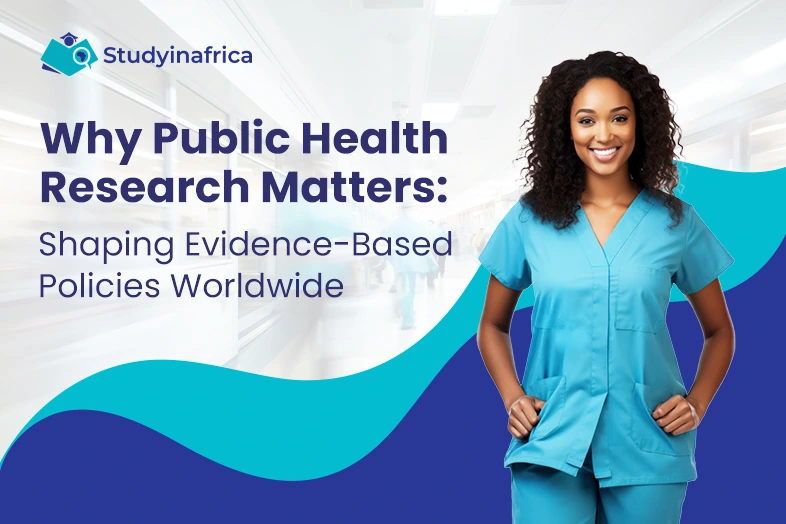
Blog Summary
Artificial Intelligence (AI) is ushering in a new era of precision, prediction, and prevention in healthcare. From detecting outbreaks early to managing health data more efficiently, AI is changing how nations safeguard public well-being. As technology continues to evolve, it’s also shaping how public health professionals are trained — especially in countries like South Africa, where modern universities blend global learning with practical application.
- Introduction: The Rise of Intelligent Public Health
- AI’s Expanding Role in Modern Health Systems
- Bridging AI and Epidemiology
- Global Collaboration Through Data and Innovation
- Preparing Future Health Leaders for the AI Era
- Flexible Learning for the Digital Generation
- AI in Practice: Real-World Benefits
- Ethics and Human-Centered Design
- The Changing Landscape of Public Health Education
- The Road Ahead: Intelligence with Purpose
Introduction: The Rise of Intelligent Public Health
Public health has always aimed to understand and improve the conditions that help people live healthier lives. What’s new today is how this understanding is achieved. AI systems can now analyze vast datasets in seconds, identifying patterns invisible to the human eye. Whether it’s detecting emerging infections or predicting hospital admission rates, technology in public health has become an essential partner in decision-making.
This shift reflects a broader transformation in global health — one that depends not only on doctors and scientists but also on data analysts, software developers, and policy thinkers working together to prevent disease rather than simply treating it.
AI’s Expanding Role in Modern Health Systems
Artificial Intelligence is being used to make healthcare systems more responsive and cost-effective. Machine learning models help detect early signs of epidemics, while predictive analytics determine where medical resources are needed most. For example, during outbreaks, AI-driven dashboards can forecast case numbers and guide response teams to high-risk areas before infections spread widely.
These innovations represent some of the most significant emerging trends in public health today. Instead of reacting to crises, health organizations are increasingly using AI tools to anticipate and prevent them. This shift toward prediction over reaction is transforming both global policy frameworks and the way students learn about healthcare management in modern classrooms.
Bridging AI and Epidemiology
While technology powers the tools, traditional science still provides the foundation. Epidemiology — the study of disease patterns — remains central to public health research. What’s changing is the sophistication of the methods being used.
AI now complements epidemiology research methods by making it possible to analyze real-time data from hospitals, laboratories, and even wearable devices. This combination enhances our ability to trace how diseases spread, evaluate interventions, and make timely decisions that save lives.
By merging classical epidemiology with artificial intelligence, public health professionals can better understand how lifestyle, environment, and social factors interact to influence health outcomes.
Global Collaboration Through Data and Innovation
The pandemic reminded the world that health challenges are never confined to one country. AI-driven platforms now enable collaboration between researchers and policymakers across borders. Data from multiple regions can be combined and analyzed instantly, helping the global community identify trends and respond collectively.
This interconnectedness has accelerated innovations in global health, encouraging governments, universities, and NGOs to share tools, findings, and technology. The result is a more coordinated approach to healthcare that emphasizes prevention, preparedness, and equity.
Through AI, even smaller countries or developing regions can contribute valuable insights to global research, making health science more inclusive than ever before.
Preparing Future Health Leaders for the AI Era
As artificial intelligence becomes integral to public health, education systems must adapt. Institutions around the world are introducing new courses that combine analytics, epidemiology, and ethics.
Students who study in South Africa now have access to some of the most forward-thinking programs in the region. Many universities in South Africa are integrating AI and data analysis modules into their public health and medical curricula. These programs encourage students to explore how technology can be applied ethically to real-world health problems — from disease tracking to community wellness initiatives.
Flexible Learning for the Digital Generation
For working professionals or international students, flexibility is key. Modern distance learning universities in South Africa now offer specialized public health programs that can be completed online without compromising academic quality.
These virtual platforms simulate real-world public health scenarios, giving students hands-on experience with digital tools and datasets. Through online collaboration and case studies, learners can apply AI concepts to problems in health surveillance, sanitation, and policy-making.
Such programs represent a model of inclusive education — one that makes advanced knowledge accessible to students across Africa and beyond.
AI in Practice: Real-World Benefits
In practice, AI-driven tools are being used to solve everyday public health problems. In some regions, predictive algorithms help track vaccine distribution and ensure doses reach rural communities efficiently. In others, natural language processing systems monitor online searches and social media to detect the early signs of disease outbreaks.
These applications demonstrate that technology in public health is not a distant dream — it’s already reshaping how governments and organizations manage care. More importantly, it’s creating data ecosystems that connect hospitals, laboratories, and policymakers in ways that make decision-making faster and more effective.
Ethics and Human-Centered Design
As AI becomes more embedded in healthcare, ethical questions must be addressed. Transparency, data privacy, and fairness are crucial for maintaining public trust. AI should assist decision-making, not replace it — and public health professionals must understand its limitations as well as its potential.
Students preparing for this future learn to balance innovation with responsibility. Many courses encourage discussions on the ethics of automation, algorithmic bias, and the role of empathy in healthcare. The goal is to create leaders who use technology thoughtfully and inclusively.
The Changing Landscape of Public Health Education
For aspiring health professionals, AI is not just a technical tool — it’s a mindset that emphasizes continuous learning and interdisciplinary collaboration. Universities are reimagining how future leaders are trained, ensuring graduates can interpret complex data, design sustainable interventions, and communicate findings effectively.
If you’re considering submitting a masters in public health application, look for programs that include modules on digital health, informatics, and predictive analytics. These courses don’t just teach technology; they teach students how to connect data with human outcomes, creating solutions that make a measurable difference in communities.
Looking to expand your academic journey in Africa?
? Discover: Explore Africa’s Top Academic Programs
The Road Ahead: Intelligence with Purpose
Artificial Intelligence has given public health a sharper lens through which to view human well-being. But it’s not just about machines making predictions — it’s about people using insights to act with empathy and precision.
As technology continues to evolve, it will redefine everything from research methods to patient care systems. Whether through advanced epidemiology, global collaboration, or digital education, AI is guiding humanity toward a smarter, more responsive healthcare future. For learners, researchers, and professionals eager to be part of this evolution, universities in South Africa provide an ideal environment — blending academic excellence, innovation, and inclusivity. Studying there means joining a global movement that believes in using knowledge and technology not merely to treat disease, but to build healthier societies.
FAQs
1. What is AI in public health?
AI in public health uses data analytics and machine learning to predict diseases, improve healthcare delivery, and support evidence-based policymaking.
2. How does technology improve public health systems?
Technology enhances surveillance, streamlines data collection, supports faster decision-making, and enables early detection of disease outbreaks for stronger public health responses.
3. Why study public health in South Africa?
South Africa offers globally recognized universities combining strong research, practical fieldwork, and flexible distance learning options in modern public health education.
4. What are emerging trends in public health today?
Key trends include AI integration, digital health systems, global data collaboration, preventive healthcare strategies, and sustainability-focused public health policies.
5. How can students apply for a Master of Public Health?
Students can submit an online masters in public health application through accredited universities offering specialized programs in public health and technology integration.


